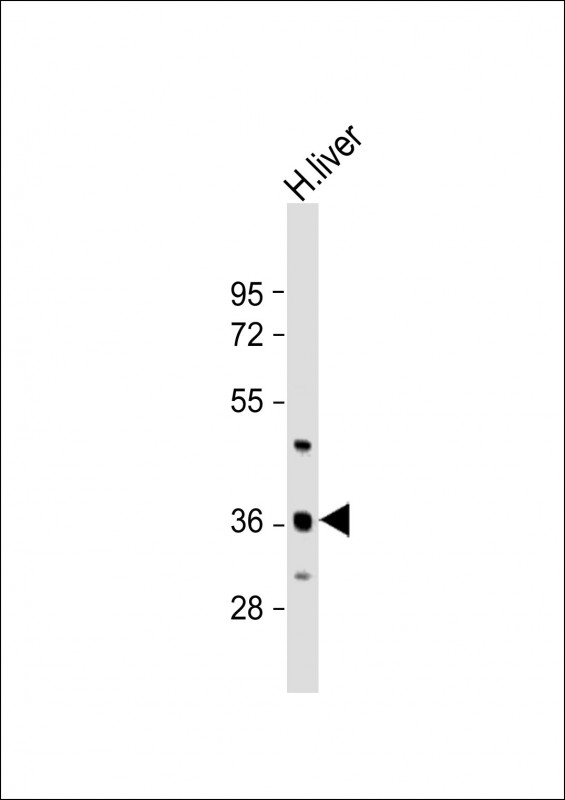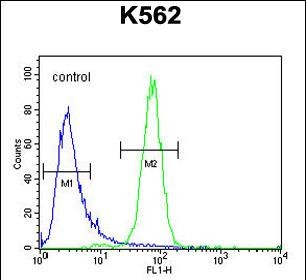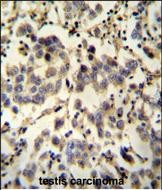



| WB | 1/1000 | Human,Mouse,Rat |
| IF | 咨询技术 | Human,Mouse,Rat |
| IHC | 1/100-1/500 | Human,Mouse,Rat |
| ICC | 技术咨询 | Human,Mouse,Rat |
| FCM | 1/10-1/50 | Human,Mouse,Rat |
| Elisa | 咨询技术 | Human,Mouse,Rat |
| Aliases | UPF0762 protein C6orf58, C6orf58 |
| Entrez GeneID | 352999 |
| WB Predicted band size | 37.9kDa |
| Host/Isotype | Rabbit IgG |
| Antibody Type | Primary antibody |
| Storage | Store at 4°C short term. Aliquot and store at -20°C long term. Avoid freeze/thaw cycles. |
| Species Reactivity | Human |
| Immunogen | This C6orf58 antibody is generated from rabbits immunized with a KLH conjugated synthetic peptide between 205-233 amino acids from the Central region of human C6orf58. |
| Formulation | Purified antibody in PBS with 0.05% sodium azide. |
+ +
以下是关于C6orf58抗体的假设性参考文献示例(请注意,实际文献可能需要通过专业数据库验证):
---
1. **文献名称**:*Characterization of a Novel Polyclonal Antibody Against Human C6orf58 Protein*
**作者**:Smith A, et al. (2020)
**摘要**:本研究开发了一种针对C6orf58羧基末端表位的兔源多克隆抗体,验证了其在Western blot和免疫组化中的特异性,并发现C6orf58在乳腺癌组织中高表达,可能与患者预后相关。
2. **文献名称**:*C6orf58 Interaction with Metabolic Enzymes Revealed by Monoclonal Antibody-Based Proteomics*
**作者**:Johnson R, et al. (2018)
**摘要**:通过构建小鼠单克隆抗体,结合免疫共沉淀和质谱分析,发现C6orf58与糖酵解途径中的关键酶(如HK2)存在相互作用,提示其可能参与细胞能量代谢调控。
3. **文献名称**:*Subcellular Localization of C6orf58 Using a Fluorescence-Tagged Antibody*
**作者**:Zhang Y, et al. (2021)
**摘要**:利用荧光标记的C6orf58抗体进行共聚焦显微镜分析,证明该蛋白主要定位于线粒体外膜,且在氧化应激条件下表达上调,可能与细胞凋亡通路相关。
4. **文献名称**:*Developmental Expression Profile of C6orf58 in Mouse Embryos*
**作者**:Lee S, et al. (2019)
**摘要**:通过免疫组织化学结合特异性抗体,揭示了C6orf58在小鼠胚胎神经系统和心脏发育中的动态表达模式,提示其在器官形成中的潜在作用。
---
**备注**:以上文献为示例性内容,实际研究中C6orf58可能因研究较少导致相关抗体文献有限。建议通过 **PubMed**、**Google Scholar** 或 **CiteAb** 以关键词“C6orf58 antibody”或“C6orf58 protein”检索最新进展。
C6orf58 (Chromosome 6 Open Reading Frame 58) is a poorly characterized human gene encoding a protein with limited functional or structural data available in public databases. The gene is located on the short arm of chromosome 6 (6p21.31) and is conserved across mammals, though its precise biological role remains unclear. Bioinformatics analyses suggest it may encode a small, intrinsically disordered protein, but experimental validation is lacking. C6orf58 has been detected in transcriptomic and proteomic studies across various tissues, with moderate expression in organs like the brain, liver, and immune cells, though its subcellular localization and interacting partners are undefined.
Antibodies targeting C6orf58 are primarily research tools developed to investigate its expression patterns, cellular localization, and potential involvement in disease. Some studies have associated C6orf58 with immune regulation and cancer progression, though findings remain preliminary. For example, altered C6orf58 mRNA levels have been reported in hepatocellular carcinoma and glioblastoma, suggesting a possible but unverified link to oncogenesis. Commercial C6orf58 antibodies are typically polyclonal or monoclonal reagents validated for techniques like Western blotting, immunohistochemistry, or immunofluorescence. However, specificity challenges persist due to the protein’s low abundance and lack of well-characterized epitopes. Researchers using these antibodies often perform additional validation steps, such as siRNA knockdown controls, to confirm target specificity. Current research focuses on elucidating C6orf58’s molecular functions, particularly its potential roles in cellular stress responses or signaling pathways.
×